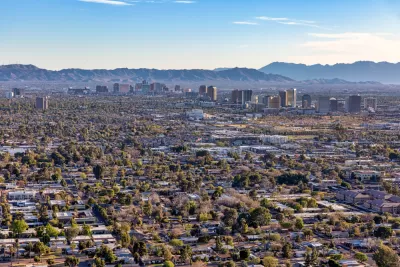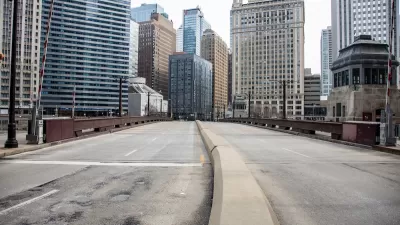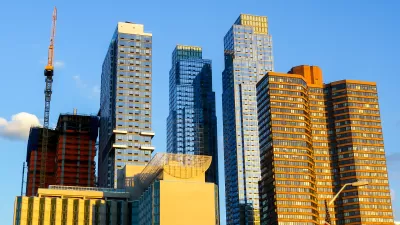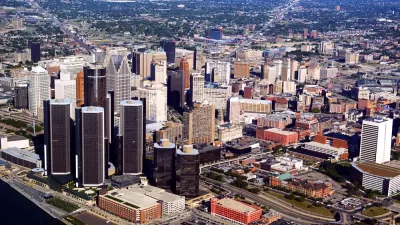Phoenix has the zoning for more height in its downtown, and future development might finally yield a more recognizable skyline.

Grace Oldham reports from Phoenix to explain the city's short building stock compared to many other cities of comparable population and preview how recent zoning code changes could yield taller buildings on the city's skyline.
Oldham interviews Joshua Bednarek, Phoenix's deputy director of planning, on the subject of the city's shorter skyline. Bednarek gives credit to the automobile for spreading the city out, and preventing the development of a vertical downtown. "With infrastructure and technology allowing increased accessibility to the entire Valley, residential and business patterns never created pressure to develop work and living space in the city's core," writes Oldham.
The city also planned for a "village system" in the 1980s, spreading its highest buildings around the city, further ensuring that the city lacks big, signature skyscrapers. Still, Downtown Phoenix has emerged "as the hub of the polycentric system today much more so than in the past," according to Bednarek, and zoning changes in 2010 and 2015 could encourage new height in the downtown core.
FULL STORY: 'Polycentric city': Why doesn't downtown Phoenix have more skyscrapers?

Maui's Vacation Rental Debate Turns Ugly
Verbal attacks, misinformation campaigns and fistfights plague a high-stakes debate to convert thousands of vacation rentals into long-term housing.

Planetizen Federal Action Tracker
A weekly monitor of how Trump’s orders and actions are impacting planners and planning in America.

San Francisco Suspends Traffic Calming Amidst Record Deaths
Citing “a challenging fiscal landscape,” the city will cease the program on the heels of 42 traffic deaths, including 24 pedestrians.

Defunct Pittsburgh Power Plant to Become Residential Tower
A decommissioned steam heat plant will be redeveloped into almost 100 affordable housing units.

Trump Prompts Restructuring of Transportation Research Board in “Unprecedented Overreach”
The TRB has eliminated more than half of its committees including those focused on climate, equity, and cities.

Amtrak Rolls Out New Orleans to Alabama “Mardi Gras” Train
The new service will operate morning and evening departures between Mobile and New Orleans.
Urban Design for Planners 1: Software Tools
This six-course series explores essential urban design concepts using open source software and equips planners with the tools they need to participate fully in the urban design process.
Planning for Universal Design
Learn the tools for implementing Universal Design in planning regulations.
Heyer Gruel & Associates PA
JM Goldson LLC
Custer County Colorado
City of Camden Redevelopment Agency
City of Astoria
Transportation Research & Education Center (TREC) at Portland State University
Jefferson Parish Government
Camden Redevelopment Agency
City of Claremont





























